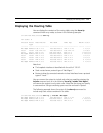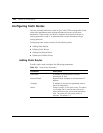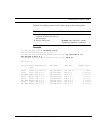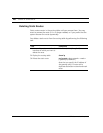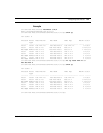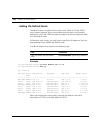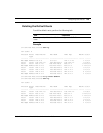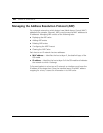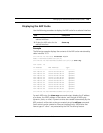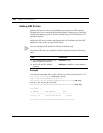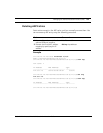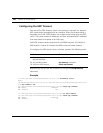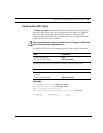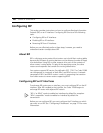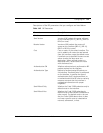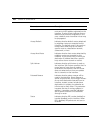
Cuda 12000 IP Access Switch CLI-based Administration Guide
Managing the Address Resolution Protocol (ARP) 285
Displaying the ARP Cache
Use the following procedure to display the ARP cache for a selected interface
Example
The following example displays the contents of the ARP cache maintained by
cable interface 1/1/1:
cli:172.16.19.10:root# interface 1/1/1
mode: interface:cable:csi(1/1/1)
cli:172.16.19.10:interface:cable:csi(1/1/1)# show arp
row count: 10
IP Address MAC Address Type
---------------- ------------------ ----------
192.168.19.51 00:10:95:04:0a:c3 dynamic
192.168.19.52 00:90:96:00:39:7f dynamic
192.168.19.53 00:10:95:01:ef:d8 dynamic
192.168.19.54 00:a0:73:69:39:65 dynamic
192.168.19.55 00:10:95:04:0a:b7 dynamic
192.168.19.56 00:90:96:00:29:71 dynamic
192.168.19.57 00:90:96:00:29:6d dynamic
192.168.19.58 00:10:95:01:f0:05 dynamic
192.168.19.59 00:90:96:00:39:f9 dynamic
192.168.19.60 00:90:83:32:9f:8c dynamic
cli:172.16.19.10:interface:cable:csi(1/1/1)#
For each ARP entry, the show arp command output displays the IP address
of a device, the MAC address of that device, and the type of ARP entry
(dynamic, static, or other). Dynamic entries are created automatically by the
ARP protocol, while static entries are created using the add arp command.
Static entries can be created on Ethernet interfaces only. ARP entries that
have a type of “other” are protected by the DHCP authority feature.
Task Command
1. Enter configuration mode for the
selected interface.
interface <c/s/i>
2. Display the ARP cache for the
selected interface.
show arp



